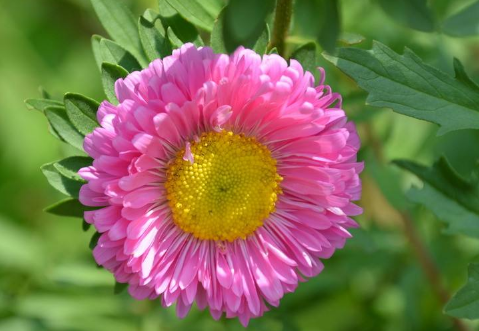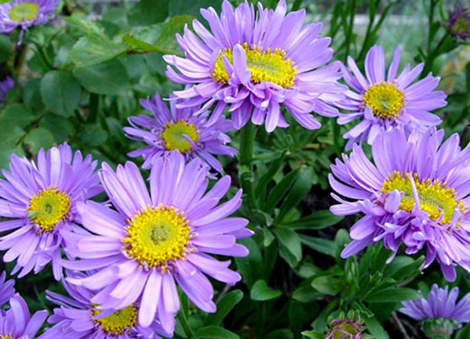Sowing time of Cuiju
Different varieties of asterine are sown at different times, and family-raised dwarf types are generally sown in spring.

Dwarf-type aster is suitable for sowing in greenhouse from February to March or sowing in sunny bed in March, flowering from May to June; sowing in open field from April to May, flowering from July to August; sowing in July, flowering in November; sowing in the middle of August, seedlings need to winter in cold bed, flowering in May 1 of the next year.
The medium-sized asterine is sown in May-June and blooms in August-September.
Tall aster can be sown in spring and summer, and can bloom in autumn.
Seed sowing and planting method of aster chinensis
Asterina common seed planting method reproduction, generally can be planted in spring and autumn, the following flower friends finishing Asterina seed planting method steps.
1, planting time
Asterina can be planted in spring and autumn, when the temperature is conducive to the growth of asterina.
2. Material preparation
Flower lovers need to prepare the soil, pots, watering devices and seeds for planting aster in advance.
3, planting methods
Can be directly scattered in the soil, seeds scattered not too concentrated, scattered point is good, seeds need to keep the soil moist after sowing, and temperature control at 18~21℃, generally about 7 days will germinate.
4. Fertilization matters
Asterina seedlings grow very fast, flower friends need to thin seedlings in time, at the same time need to use fully decomposed high-quality organic fertilizer as base fertilizer, chemical fertilizer can be used as topdressing, to supplement the nutrients for seedling growth.
5. Transplanting
After emergence, the seedlings should be thinned in time. After one transplant, the seedlings should be planted when they are 10 cm high. During summer drought, frequent irrigation is required. Autumn cut flowers used in the aster, must be used in the middle of the night for 1-2 hours to promote the elongation of flower stems and flowering.
How to grow Asterina 1. Moisture
Chrysanthemum like wet environment, but because it is a shallow root plant, should not be too wet, in the growth period to keep the pot soil moist, conducive to the growth of plants, dry summer, you can appropriately increase the amount of watering. After budding, watering should be controlled to inhibit the growth of main branches, otherwise it will affect flowering if it grows too long.
2. sunshine
Kingfisher likes sunshine and is suitable for growing in a ventilated and sunny environment. Therefore, the demand for light is very large. Long sunshine every day can keep the plant short and conducive to flowering. Short sunshine will make the plant grow taller and delay flowering.
3. temperature
The suitable temperature for growth of Asterina chinensis is between 15℃ and 25 ℃, and its cold resistance and heat resistance are weak. In winter, the temperature should not be lower than 0℃, otherwise it will be frostbite; in summer, if the temperature exceeds 30℃, it will make the plants bloom less or delay flowering.
4. fertilizer
Chrysanthemum growth does not choose soil, preferably fertile sandy soil, but it likes fertilizer, planting time to have sufficient organic fertilizer, seedlings can be topdressing, monthly application of thin liquid fertilizer can be, more conducive to plant growth.
- Prev

What are the propagation methods of Salvia miltiorrhiza
What are the propagation methods of Salvia miltiorrhiza
- Next

Sowing method of Cui Chrysanthemum
1. The seeds of green chrysanthemum are relatively large. We should insert the tip of the seed into the soil one by one. Note that Cuiju is a shallow-rooted plant, not too deep. two。 Keep the temperature about 20 ℃, the soil is moist and fertile, and seedlings can grow after a week of sowing. 3. The seedling can be planted when it grows to 10 cm, and it is high in summer.
Related
- Fuxing push coffee new agricultural production and marketing class: lack of small-scale processing plants
- Jujube rice field leisure farm deep ploughing Yilan for five years to create a space for organic food and play
- Nongyu Farm-A trial of organic papaya for brave women with advanced technology
- Four points for attention in the prevention and control of diseases and insect pests of edible fungi
- How to add nutrient solution to Edible Fungi
- Is there any good way to control edible fungus mites?
- Open Inoculation Technology of Edible Fungi
- Is there any clever way to use fertilizer for edible fungus in winter?
- What agents are used to kill the pathogens of edible fungi in the mushroom shed?
- Rapid drying of Edible Fungi

